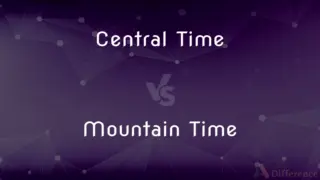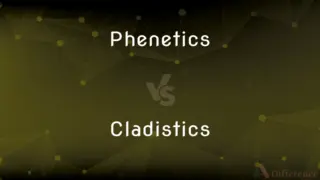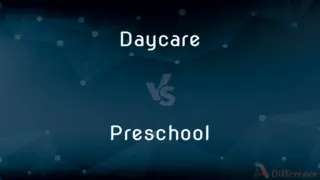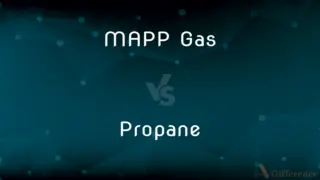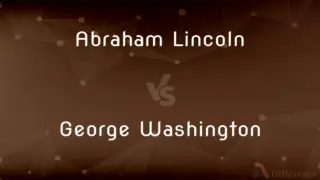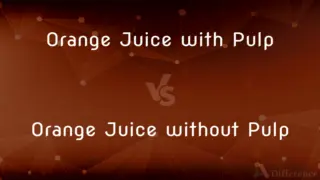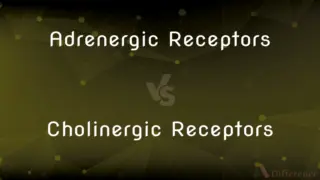Child vs. Kid — What's the Difference?
By Tayyaba Rehman — Updated on October 5, 2023
"Child" and "Kid" both refer to a young human being. "Child" is more formal and can be used in legal and official contexts, while "Kid" is informal and used in everyday, casual speech.

Difference Between Child and Kid
Table of Contents
ADVERTISEMENT
Key Differences
"Child" embodies a sense of innocence and purity often used in formal and legal contexts. On the other hand, "Kid" harbors a colloquial tint, often employed in everyday, informal conversations.
The word "Child" is derived from Old English and historically carries with it a measure of formality and antiquity. "Kid", despite its informal nuance, is historically rooted in its initial usage for a young goat, eventually transitioning to refer to children in a more casual context.
In educational and developmental psychology, "Child" is habitually used to refer to young individuals, noting their stages of development and growth. "Kid", while understood, is more likely to appear in less formal and more interpersonal or familial dialogues.
"Child" can often be found in legal texts, ensuring clarity and precision in interpretation. "Kid", by contrast, might be perceived as too casual for such official documents and is seldom found in legal prose.
In literature, "Child" may be used to evoke a sense of universality and commonality in experience and development. Conversely, "Kid" might be employed in dialogues or narratives to portray a more relaxed or casual interaction among characters.
ADVERTISEMENT
Comparison Chart
Formality
Formal and used in legal texts
Informal and colloquial
Origin
Old English
Initially referred to young goat
Usage in Writing
Common in academic writing
Preferred in casual writing
Emotional Connotation
Sometimes neutral or formal
Can be endearing or casual
Applicability in Official Documents
Often used
Seldom used
Compare with Definitions
Child
A daughter or son of any age.
Her child, now a successful doctor, visited her every weekend.
Kid
A young goat.
Child
Biologically, a child (plural children) is a human being between the stages of birth and puberty, or between the developmental period of infancy and puberty. The legal definition of child generally refers to a minor, otherwise known as a person younger than the age of majority.
Kid
One of the young of certain similar animals.
Child
A person between birth and puberty.
Kid
The flesh of a young goat.
Child
A person who has not attained maturity or the age of legal majority.
Kid
Leather made from the skin of a young goat; kidskin.
Child
An unborn infant; a fetus.
Kid
An article made from this leather.
Child
An infant; a baby.
Kid
A child.
Child
One who is childish or immature.
Kid
A young person.
Child
Someone to whom a specified person is a parent.
Kid
(Slang)Pal. Used as a term of familiar address, especially for a young person
Hi, kid! What's up?.
Child
A member of a tribe; descendant
Children of Abraham.
Kid
Made of the skin or with the meat of a young goat.
Child
An individual regarded as strongly affected by another or by a specified time, place, or circumstance
A child of nature.
A child of the Sixties.
Kid
(Informal)Younger than oneself
My kid brother.
Child
A product or result of something specified
“Times Square is a child of the 20th century” (Richard F. Shepard).
Kid
To mock playfully; tease
They kidded me about my mismatched socks.
Child
A person who has not yet reached adulthood, whether natural (puberty), cultural (initiation), or legal (majority).
Go easy on him: he is but a child.
Kid
To deceive in fun; fool
I could only hope they were kidding me when they said my car had been stolen.
Child
A kid aged 1 to 11 years, whereas neonates are aged 0 to 1 month, infants are aged 1 month to 12 months, and adolescents are aged 12 years to 18 years.
Regular chores can be appropriate for both children and adolescents, given age-appropriate limits on difficulty level and time on task.
Kid
To deceive (oneself), especially by allowing one's desires to cloud one's judgment
You're kidding yourself if you think that plan will work.
Child
(with possessive) One's direct descendant by birth, regardless of age; one's offspring; a son or daughter.
My youngest child is forty-three this year.
His adult children visit him yearly.
Kid
To engage in teasing or good-humored fooling
You want that much for your old car? You must be kidding!.
Child
(cartomancy) The thirteenth Lenormand card.
Kid
To bear young. Used of a goat or similar animal.
Child
(figurative) A figurative offspring, particularly:
Kid
A young goat.
He treated the oxen like they didn't exist, but he treated the goat kid like a puppy.
Child
A person considered a product of a place or culture, a member of a tribe or culture, regardless of age.
The children of Israel.
He is a child of his times.
Kid
Of a female goat, the state of being pregnant: in kid.
Child
Anything derived from or caused by something.
Kid
Kidskin.
Child
(computing) A data item, process, or object which has a subservient or derivative role relative to another.
The child node then stores the actual data of the parent node.
Kid
(uncountable) The meat of a young goat.
Child
Youth of noble birth
Kid
A young antelope.
Child
(mathematics) A subordinate node of a tree.
Kid
(informal) A child (usually), teenager, or young adult; a juvenile.
She's a kid. It's normal for her to have imaginary friends.
Child
A female child, a girl.
Kid
(informal) A person whose childhood took place in a particular time period or area.
Only '90s kids will remember this toy.
He's been living in Los Angeles for years now, but he's a Florida kid.
Child
To give birth; to beget or procreate.
Kid
(informal) One's son or daughter, regardless of age.
He was their youngest kid.
Child
A son or a daughter; a male or female descendant, in the first degree; the immediate progeny of human parents; - in law, legitimate offspring. Used also of animals and plants.
Kid
(in the vocative) Used as a form of address for a child, teenager or young adult.
No, kid, you didn't do anything wrong; they did!
Child
A descendant, however remote; - used esp. in the plural; as, the children of Israel; the children of Edom.
Kid
(colloquial) An inexperienced person or one in a junior position.
Child
One who, by character of practice, shows signs of relationship to, or of the influence of, another; one closely connected with a place, occupation, character, etc.; as, a child of God; a child of the devil; a child of disobedience; a child of toil; a child of the people.
Kid
(dated) A deception; an act of kidding somebody.
Child
A noble youth. See Childe.
Kid
(nautical) A small wooden mess tub in which sailors received their food.
Child
A young person of either sex. esp. one between infancy and youth; hence, one who exhibits the characteristics of a very young person, as innocence, obedience, trustfulness, limited understanding, etc.
When I was child. I spake as a child, I understood as a child, I thought as a child; but when I became a man, I put away childish things.
Kid
A fagot; a bundle of heath and furze.
Child
A female infant.
A boy or a child, I wonder?
Kid
To make a fool of (someone).
Child
To give birth; to produce young.
This queen Genissa childing died.
It chanced within two days they childed both.
Kid
To dupe or deceive (someone).
Child
A young person of either sex;
She writes books for children
They're just kids
`tiddler' is a British term for youngsters
Kid
To make a joke with (someone).
Child
A human offspring (son or daughter) of any age;
They had three children
They were able to send their kids to college
Kid
(intransitive) Of a goat, to give birth.
Child
An immature childish person;
He remained a child in practical matters as long as he lived
Stop being a baby!
Kid
To joke.
You're kidding!
Only kidding
Child
A member of a clan or tribe;
The children of Israel
Kid
A young goat.
The . . . leopard shall lie down with the kid.
Child
A person in the stages of development from infancy to puberty.
The child began to cry when he dropped his ice cream cone.
Kid
A young child or infant; hence, a simple person, easily imposed on.
Child
Someone who is humanly innocent or free from malice.
Her heart was kind, like a gentle child.
Kid
A kind of leather made of the skin of the young goat, or of the skin of rats, etc.
Child
A person heavily influenced or shaped by something.
He was a child of the 80s, always playing retro video games.
Kid
Gloves made of kid.
Child
An individual below the age of adulthood as defined by law.
The court decided the child should live with her grandmother.
Kid
A small wooden mess tub; - a name given by sailors to one in which they receive their food.
Kid
Among pugilists, thieves, gunfighters, etc., a youthful expert; - chiefly used attributively; as, kid Jones.
Kid
A fagot; a bundle of heath and furze.
Kid
To bring forth a young goat.
Kid
Of Kythe.
Kid
A young person of either sex;
She writes books for children
They're just kids
`tiddler' is a British term for youngsters
Kid
Soft smooth leather from the hide of a young goat;
Kid gloves
Kid
English dramatist (1558-1594)
Kid
A human offspring (son or daughter) of any age;
They had three children
They were able to send their kids to college
Kid
Young goat
Kid
Tell false information to for fun;
Are you pulling my leg?
Kid
Be silly or tease one another;
After we relaxed, we just kidded around
Kid
Informal term for someone's child.
His kid is starting school next week.
Kid
A playful or mischievous person.
You're such a kid, always playing pranks!
Kid
Used casually to refer to a person (not necessarily young).
Hey kid, great job out there!
Common Curiosities
Are the plurals "Children" and "Kids"?
Yes, those are the correct plurals.
Can "Kid" be used affectionately for adults?
Sometimes, especially in casual American English.
Is "Child" more formal than "Kid"?
Yes, "Child" is more formal than "Kid".
Can "Kid" be used to refer to a teenager?
Yes, but often for younger teens, not older.
Can "Kid" be used formally?
Rarely, it's mostly used in informal contexts.
Can "Kid" and "Child" be used interchangeably?
Often yes, but careful with formal vs. informal contexts.
Is "Child" ever used in a negative way?
Rarely, unless context gives it a negative connotation.
Can "Child" refer to offspring of any age?
Yes, like saying "She is my child".
Does "Child" have synonyms?
Yes, like "youngster" or "youth".
Can "Kid" refer to animals?
Yes, "Kid" can refer to a young goat.
Is "Child" used in legal documents?
Yes, "Child" is commonly used in legal contexts.
What is a "kid" in terms of leather?
"Kid" refers to a type of soft leather from young goats.
Does "Child" imply a certain age range?
It generally implies a person from birth to puberty.
What's a phrase including "Kid"?
"Just kidding" is a common phrase.
Can both "Child" and "Kid" refer to a girl or boy?
Yes, both terms are gender-neutral.
Share Your Discovery

Previous Comparison
Hegemony vs. Ideology
Next Comparison
Apraxia vs. DyspraxiaAuthor Spotlight
Written by
Tayyaba RehmanTayyaba Rehman is a distinguished writer, currently serving as a primary contributor to askdifference.com. As a researcher in semantics and etymology, Tayyaba's passion for the complexity of languages and their distinctions has found a perfect home on the platform. Tayyaba delves into the intricacies of language, distinguishing between commonly confused words and phrases, thereby providing clarity for readers worldwide.














